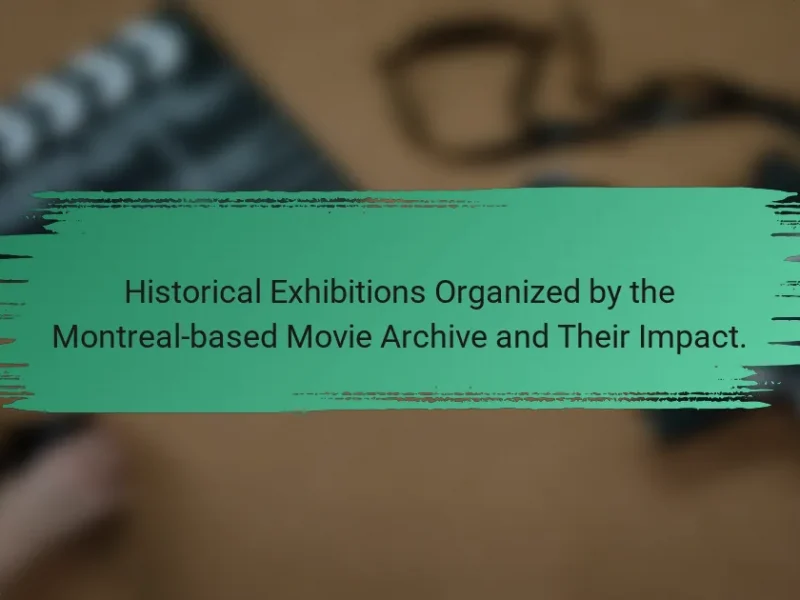The Montreal-based Movie Archive is a film preservation organization dedicated to collecting, preserving, and showcasing a diverse range of cinematic works, including independent and international films. This archive plays a vital role in the film community by providing resources for filmmakers and researchers, hosting screenings, and promoting film culture. It specializes in Canadian cinema history, holding rare films and extensive documentation on filmmakers and production in Canada. The archive collaborates with international film festivals, enhancing the visibility of Canadian films globally, and offers interactive platforms for audiences to engage with its extensive collection through online streaming, virtual screenings, and community events.

What is The Montreal-based Movie Archive?
The Montreal-based Movie Archive is a film preservation organization located in Montreal, Canada. It focuses on collecting, preserving, and showcasing films. The archive holds a diverse collection of cinematic works, including independent and international films. It plays a crucial role in the film community by providing resources for filmmakers and researchers. The organization also hosts screenings and events to promote film culture. Its efforts contribute to the wider appreciation of cinema at international film festivals. The archive is recognized for its commitment to preserving film history and supporting emerging filmmakers.
How was The Montreal-based Movie Archive established?
The Montreal-based Movie Archive was established in 1963. It was founded by a group of film enthusiasts and professionals. Their goal was to preserve and promote Canadian cinema. The archive began collecting films, documents, and memorabilia related to film history. It aimed to serve as a resource for researchers and filmmakers. Over the years, the archive expanded its collection significantly. It became a vital institution for film preservation in Canada. Today, it plays a crucial role in supporting international film festivals.
What are the key milestones in its history?
The Montreal-based Movie Archive has several key milestones in its history. It was established in 1963, marking the beginning of its commitment to film preservation. In 1974, it organized its first international film festival, enhancing its global presence. The archive became a member of the International Federation of Film Archives in 1980, solidifying its role in the preservation community. In 1995, it launched a digital archive, modernizing access to its collections. By 2005, it had hosted over 100 film festivals, showcasing its influence on international cinema. In 2010, it initiated educational programs to promote film literacy. These milestones illustrate its significant impact on the film industry and international film festivals.
Who are the founders and key figures behind the archive?
The Montreal-based Movie Archive was founded by a group of film enthusiasts and preservationists. Key figures include Claude Jutra, a prominent filmmaker and advocate for film preservation. Another important figure is André B. M. G. Gagnon, who played a significant role in the archive’s development. Their collective efforts established the archive as a vital resource for filmmakers and historians. The archive has since influenced numerous international film festivals by providing access to rare films and fostering appreciation for cinematic history.
What is the mission of The Montreal-based Movie Archive?
The mission of The Montreal-based Movie Archive is to preserve and promote Canadian cinema. This organization aims to safeguard film heritage for future generations. It collects, catalogs, and restores films to ensure their accessibility. The Archive also supports filmmakers through educational programs and resources. By engaging with the community, it fosters a deeper appreciation for film culture. This commitment to preservation and education enhances the visibility of Canadian films. The Archive plays a crucial role in the global film landscape by participating in international festivals. Its efforts contribute to the recognition of Canadian cinema worldwide.
How does the archive define its goals and objectives?
The archive defines its goals and objectives by focusing on the preservation and promotion of cinematic heritage. It aims to collect, restore, and make accessible significant films. The archive seeks to support filmmakers and researchers through various initiatives. It also aims to enhance public engagement with film culture. The objectives include fostering collaboration with international film festivals. This collaboration helps to showcase diverse cinematic works. The archive’s commitment to education and outreach is evident in its programming. These efforts solidify its role as a key player in the global film community.
What values guide the operations of The Montreal-based Movie Archive?
The Montreal-based Movie Archive operates under values of preservation, accessibility, and education. Preservation focuses on safeguarding cinematic history through careful archiving. Accessibility ensures that films are available to diverse audiences. Education promotes understanding and appreciation of film as an art form. These values guide their initiatives and community engagement efforts. They aim to foster a deeper connection between the public and the cinematic heritage. The archive collaborates with local and international partners to enhance its impact.
How does The Montreal-based Movie Archive influence international film festivals?
The Montreal-based Movie Archive influences international film festivals by preserving and showcasing diverse cinematic works. It serves as a vital resource for filmmakers and curators. The Archive’s extensive collection includes rare films and historical footage. This collection enriches festival programming and promotes cultural exchange. Additionally, the Archive hosts events that connect filmmakers with audiences. Collaborations with festival organizers enhance visibility for underrepresented voices. By facilitating access to unique content, the Archive shapes festival narratives and themes. Its impact is evident in the increased inclusion of international films in festival lineups.
What role does the archive play in film preservation and promotion?
The archive plays a crucial role in film preservation and promotion. It systematically collects, stores, and maintains films to prevent deterioration. This ensures that historical and culturally significant works remain accessible for future generations. The archive also promotes films through curated screenings and exhibitions. These events help raise awareness of classic and lesser-known films. Additionally, the archive provides resources for research and education in film studies. By collaborating with film festivals, it enhances visibility for restored films. This partnership fosters appreciation and understanding of cinematic heritage.
How does the archive collaborate with international film festivals?
The archive collaborates with international film festivals by providing curated film selections. These selections often feature rare and historical films that enhance festival programs. The collaboration includes sharing expertise in film preservation and restoration. This ensures that films presented are of high quality. Additionally, the archive may participate in panel discussions and workshops at festivals. These events focus on topics like film history and preservation techniques. The archive’s involvement helps foster connections between filmmakers and audiences. This collaboration enriches the cultural exchange at international film festivals.

What are the unique attributes of The Montreal-based Movie Archive?
The Montreal-based Movie Archive has several unique attributes. It specializes in preserving Canadian cinema history. The archive contains rare films not found elsewhere. It offers extensive documentation on filmmakers and film production in Canada. The archive collaborates with international film festivals. This collaboration enhances the visibility of Canadian films globally. It features a vast collection of film formats, including digital and analog. The archive also provides educational resources for film studies.
What types of films does The Montreal-based Movie Archive focus on?
The Montreal-based Movie Archive focuses on independent and documentary films. This archive emphasizes films that showcase diverse voices and unique storytelling. It aims to preserve and promote works that may not receive mainstream attention. The collection includes films from various genres and cultural backgrounds. This approach aligns with the archive’s mission to support filmmakers and enrich the cinematic landscape.
How does the archive curate its collection of films?
The archive curates its collection of films through a systematic selection process. It evaluates films based on historical significance, cultural impact, and artistic merit. Experts in film history and curation assess submissions. The archive prioritizes works that represent diverse voices and perspectives. It also considers films that have contributed to cinematic innovation. The collection aims to preserve important cultural artifacts for future generations. The archive collaborates with filmmakers and institutions for comprehensive representation. This approach ensures a rich and varied film collection that supports educational initiatives.
What genres are most represented in the archive?
The most represented genres in the archive are documentary, drama, and animation. Documentaries account for a significant portion, showcasing real-life events and stories. The drama genre follows closely, featuring narratives that explore complex human emotions. Animation also holds a prominent place, highlighting creativity and artistic expression. These genres collectively reflect the diverse storytelling approaches within the archive. The representation of these genres supports the archive’s role in influencing international film festivals.
What impact does The Montreal-based Movie Archive have on filmmakers?
The Montreal-based Movie Archive significantly supports filmmakers by preserving their works and providing access to historical film resources. This access helps filmmakers understand cinematic trends and influences. The Archive offers educational programs that enhance filmmakers’ skills and knowledge. Additionally, it facilitates networking opportunities among filmmakers and industry professionals. By hosting screenings and events, the Archive promotes emerging filmmakers’ visibility. This visibility can lead to distribution deals and festival selections. The Archive’s resources also assist in research for new projects. Overall, it plays a crucial role in the development and success of filmmakers in the industry.
How does the archive support emerging filmmakers?
The archive supports emerging filmmakers by providing access to a vast collection of films and resources. It offers educational programs that enhance filmmaking skills. The archive hosts workshops and seminars led by industry professionals. These initiatives foster networking opportunities among filmmakers. Additionally, the archive curates film screenings that showcase emerging talent. This exposure can lead to opportunities at international film festivals. The archive also offers funding and grants for innovative projects. These resources are crucial for filmmakers seeking to establish their careers.
What resources does the archive provide to film professionals?
The archive provides a range of resources to film professionals. It offers access to a vast collection of films, including rare and historical titles. Film professionals can utilize research materials related to film history and theory. The archive also provides screening facilities for film presentations and events. Additionally, it offers workshops and training programs to enhance filmmaking skills. Networking opportunities with industry professionals are available through the archive’s events. These resources support the development and promotion of film projects. The archive’s extensive database aids in film research and analysis.

How can audiences engage with The Montreal-based Movie Archive?
Audiences can engage with The Montreal-based Movie Archive through various interactive platforms. They can access the archive’s extensive collection of films online. The website offers streaming options for selected titles. Audiences can also participate in virtual screenings and discussions hosted by the archive. Additionally, the archive organizes events and workshops that encourage community involvement. Social media channels provide updates and opportunities for audience interaction. Engaging with the archive enhances appreciation for cinema and its history.
What events does The Montreal-based Movie Archive host?
The Montreal-based Movie Archive hosts various film screenings, workshops, and panel discussions. These events focus on film preservation and appreciation. The archive often collaborates with film festivals. Notable festivals include the Montreal International Documentary Festival. They also feature retrospectives of influential filmmakers. Educational programs are designed to engage the community. Special events may include guest speakers from the film industry. These initiatives promote the importance of film heritage.
How can individuals participate in screenings and discussions?
Individuals can participate in screenings and discussions by attending events organized by film archives and festivals. These events often include public screenings of films followed by discussions. Interested individuals can check the schedules on the official websites of the Montreal-based Movie Archive and affiliated festivals. Many screenings are open to the public, and tickets can be purchased online or at the venue. Discussions usually feature filmmakers, critics, or scholars who provide insights into the films shown. Engaging in Q&A sessions after screenings is also a common way for individuals to participate. Additionally, individuals can join mailing lists or social media groups to stay updated on upcoming events.
What educational programs are offered by the archive?
The archive offers various educational programs focused on film studies. These programs include workshops, seminars, and lectures. They aim to enhance understanding of film history and production techniques. The archive also provides resources for research and study. Additionally, partnerships with educational institutions are common. These collaborations facilitate hands-on learning experiences. Participants gain insights from industry professionals through these programs. Overall, the archive plays a vital role in film education.
What are the best practices for utilizing The Montreal-based Movie Archive’s resources?
Utilizing The Montreal-based Movie Archive’s resources effectively involves several best practices. First, familiarize yourself with the archive’s catalog and indexing system. This allows for efficient searching of specific films or topics. Second, prioritize accessing digital resources when available. Digital formats often provide easier access and better preservation. Third, attend workshops or seminars hosted by the archive. These events often include expert guidance on navigating the resources. Fourth, engage with staff members for personalized assistance. They can provide insights and recommendations tailored to your research needs. Lastly, utilize the archive’s partnerships with film festivals for exclusive access to screenings and events. These practices enhance the overall experience and maximize the value of the archive’s offerings.
How can researchers benefit from the archive’s collections?
Researchers can benefit from the archive’s collections by accessing a wealth of historical film data. The collections include rare films, documents, and artifacts that are not available elsewhere. This unique access allows researchers to conduct in-depth analyses of film history and trends. The archive also offers primary sources for studying the evolution of cinematic techniques. Furthermore, researchers can uncover underrepresented narratives in cinema through these collections. The availability of curated collections aids in comparative studies across international film festivals. Overall, the archive serves as a vital resource for scholarly research in film studies.
What tips can enhance the experience of using the archive’s services?
Utilizing the archive’s services effectively can enhance user experience significantly. First, familiarize yourself with the archive’s cataloging system. Understanding how films are categorized will save time. Next, take advantage of the archive’s online resources. Many archives offer digital access to collections. This allows for remote viewing and research.
Additionally, attend workshops or seminars offered by the archive. These events often provide valuable insights into the collection. Engaging with staff can also enhance your experience. They can offer personalized assistance and recommendations based on your interests. Lastly, participate in community events organized by the archive. These events foster networking and collaboration opportunities with other film enthusiasts.
The Montreal-based Movie Archive is a film preservation organization dedicated to collecting, preserving, and showcasing Canadian cinema. Established in 1963, it has significantly influenced international film festivals by providing access to rare films and promoting cultural exchange. The archive supports filmmakers through educational programs and resources, while its extensive collection includes independent and documentary films. Key milestones in its history highlight its commitment to film preservation, and its collaborations with festivals enhance the visibility of underrepresented voices in cinema.


